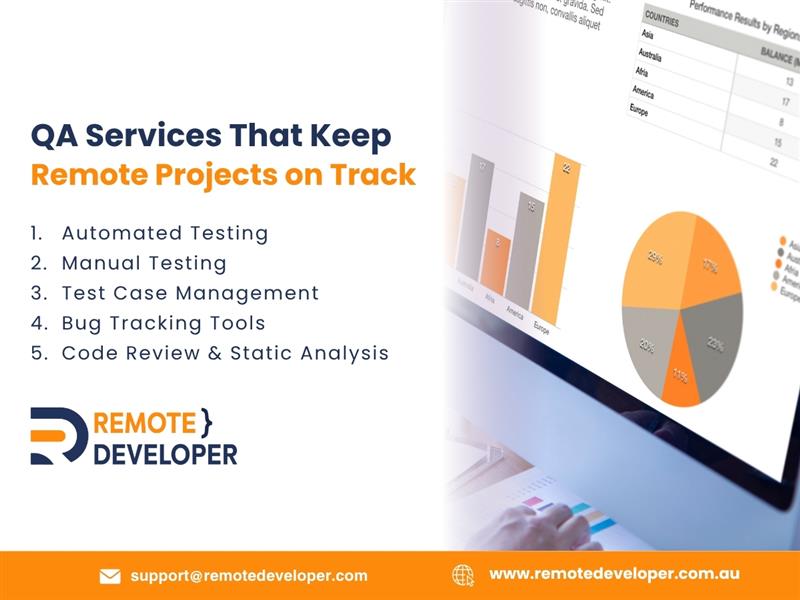Remote development has opened the door to global talent, faster timelines, and more flexible workflows. As more companies look to build a remote dev team, the need for consistent quality control also grows. That’s where professional QA services play a bigger role than ever before.
In remote environments, teams often work in silos across time zones and platforms. Without a solid QA process in place, small issues can slip through and snowball into major setbacks. A strong QA strategy helps teams stay on track, build trust, and deliver better digital products.
What Are QA Services?
QA services, or Quality Assurance services, refer to the practices and tools used to maintain high standards throughout the software development process. These services include everything from test planning and execution to bug tracking and performance monitoring. Whether automated or manual, QA helps identify issues before they reach end users.
Instead of being a final checkpoint, QA is integrated into each development phase to ensure consistent results. It gives developers the confidence to make changes, knowing they won’t break existing functionality. This structured approach is essential for remote teams working under different conditions but aiming for the same high-quality outcome.
Why Quality Assurance Matters More in Remote Setups
In remote development, teams often work independently across different locations, which can make collaboration and oversight harder. Without physical proximity, it’s easier for miscommunications or overlooked bugs to slip through. Quality assurance acts as the glue that keeps distributed teams aligned and ensures the final product meets expectations.
Remote setups rely heavily on digital tools and asynchronous updates, which can introduce delays or gaps in testing feedback. QA services provide a consistent framework that keeps everyone accountable, even when they’re not online at the same time. This structure helps maintain code quality, reduce bottlenecks, and keep progress steady.
Unlike in-office environments where testing can be discussed on the spot, remote teams need defined QA processes to flag, track, and resolve issues efficiently. Strong QA practices bring clarity to workflows, ensuring that nothing falls through the cracks. For remote development to succeed, quality assurance isn’t just helpful, it’s essential.
How QA Services Improve Remote Projects
QA services aren’t just a safety net—they’re a driving force behind successful remote development. They keep quality in check, help teams move faster, and ensure nothing slips through the cracks.

1. Shorter Feedback Loops
Automated testing and real-time bug tracking create faster communication between testers and developers. This minimises delays and ensures issues are addressed before they snowball into larger problems. The quicker the feedback, the smoother and faster your remote workflow becomes.
2. Higher Product Stability
Quality assurance practices help catch bugs and vulnerabilities early in the development cycle. By resolving issues before they reach end users, you reduce downtime, emergency fixes, and customer complaints. A consistently stable product builds credibility and encourages long-term user trust.
3. Better Scalability
As remote teams expand and product complexity increases, QA services provide the necessary structure to maintain quality control. They allow your team to handle growing codebases and feature updates without missing a beat. With a solid QA foundation, scaling your product becomes more manageable and less risky.
4. Improved Developer Focus
With a dedicated QA process in place, developers can direct their energy toward creating and improving features. This clear separation of duties boosts overall efficiency and reduces the mental load on engineering teams. Developers can build better products when they aren’t constantly pulled into testing cycles.
5. Enhanced User Satisfaction
Users today expect flawless digital experiences across all platforms. QA ensures the product is user-friendly, responsive, and functional under real-world conditions. When users encounter fewer bugs and smoother interactions, they’re more likely to return, engage, and recommend your brand.
QA Services Challenges in Remote Teams
Remote development brings flexibility, but it also introduces new challenges for maintaining quality. From miscommunication to time zone friction, remote QA needs extra structure to stay effective.

1. Communication Gaps
Remote work limits face-to-face conversations, making it harder to clarify issues quickly. Misunderstandings around feature requirements or bug behaviour can slow down testing and development. Clear documentation and structured QA processes become essential in bridging this gap.
2. Time Zone Differences
With testers and developers in different time zones, feedback loops can stretch longer than necessary. Delays in addressing bugs or verifying fixes can push deadlines. QA teams need to plan around this by creating asynchronous processes that keep progress moving forward.
3. Inconsistent Test Environments
Not every team member may be working with the same tools, browsers, or device setups. This creates inconsistencies when reproducing bugs or testing performance. QA services help standardise these environments, reducing variability in test results.
4. Limited Oversight & Alignment
Without in-person collaboration, it’s easy for team members to work in silos. This often leads to duplicated efforts or missed test cases. Regular QA reviews and sprint-level syncs keep everyone aligned and focused on shared goals.
5. Delayed Bug Tracking & Fixes
When bugs are found late, they’re often more expensive and time-consuming to fix. Remote setups may cause testers to report issues after developers have moved on to other tasks. QA services provide a structured system for early bug detection, saving time and resources.
QA Services That Keep Remote Projects on Track
Quality assurance helps remote teams stay organised and spot issues early. With the right QA services in place, projects run smoother and results improve.

1. Automated Testing
Automated tests help run repetitive checks quickly and consistently. This is especially useful when deploying frequent updates or supporting multiple devices. Automation lets your team catch errors faster while focusing their time on more complex test scenarios.
2. Manual Testing
Manual QA is crucial for evaluating user experience, accessibility, and creative interactions. It allows testers to explore real-world behaviour that automated scripts might miss. Using reliable manual testing tools enhances this process, ensuring complete coverage and deeper insights.
3. Test Case Management
Using a central system to organise and manage test cases helps teams stay aligned. It provides visibility into what’s been tested, what’s pending, and what needs attention. This makes collaboration easier across remote environments.
4. Bug Tracking Tools
Platforms like Jira or Trello allow QA teams to report, assign, and track bugs in real time. These tools improve accountability and help streamline workflows between testers and developers. Clear tracking ensures nothing falls through the cracks.
5. Code Review & Static Analysis
QA services also involve analysing code for potential risks or inefficiencies before it’s released. Static analysis tools help catch vulnerabilities early, improving code quality. Integrating this into your pipeline helps teams maintain high standards.
Final Thoughts
Remote development presents new opportunities, but also demands more structure and communication. QA services act as a safety net, keeping quality consistent even when your team is miles apart. They help prevent costly mistakes and strengthen team alignment throughout the project lifecycle.
By embedding QA into your remote workflows, you’re not only improving software quality but also future-proofing your development process. With the right strategy in place, QA services become your strongest ally in delivering better, faster, and smarter.
Ready to take your remote development to the next level? Contact us today to learn how our QA services can support your success.

